#cktheoveranalyzer
Text
Hi there. I’m an architecture student working on my thesis project, which is focused on PUBLIC RESTROOM DESIGN.
I don’t just want to do what I think is a good idea in a restroom, but want to make sure I’m getting a wide variety of opinions on restrooms to make it better for everyone, not just me. So I’ve made this survey.
I would really appreciate it if you guys would fill this out and maybe force your friends and loved ones to fill it out too; I want as much data as possible
Thanks!
#ck overanalysis#cktheoveranalyzer#design overanalysis#disability design#design analysis#design#restrooms#public restrooms#public restroom design#architecture student#architecture thesis#architecture project#poll#survey#please help#please fill out this survey
5 notes
·
View notes
Text
Random Monster High thought no one asked for or expected from me
Last night I suddenly realized why Ghoulia and Cleo DeNile are friends. They’re both sort of decaying undead creatures. Like zombies are more decaying but mummies decay in more of a dry way cuz they’re partially preserved. Mummies are basically just… Dried out zombies…
I really do wish they better emphasized the mummies’ mummy-ness. Like made them look a little more spooky. They often look just like Egyptians instead of mummified Egyptians. They talk about Draculaura needing really high SPF to go out in the sun. Why not talk about how the mummies need lots of moisturizer cuz their skin is insanely dry?
#Monster High#Monster High analysis#Cleo DeNile#Cleo DeNile analysis#Ghoulia Yelps#Cleo and Ghoulia#mummy#mummies#mummies are basically just dried out zombies#analysis#cktheoveranalyzer#CassieKay
37 notes
·
View notes
Text
I’m not afraid of heights.
I’m afraid of the little voice in my head that tells me to jump.
#intrusive thoughts#anxiety#depression#mental health analysis#mental health#mental illness#mental wellness#wellness analysis#wellness#CK thoughts#cktheoveranalyzer#CassieKay
4 notes
·
View notes
Text
Depression be like “I’m sorry I can’t complete the tasks I was supposed to do today; I’m too busy being sad”
#sad boi hours#depression#executive dysfunction#mental health overanalysis#mental health analysis#cktheoveranalyzer#ck talks#ck thoughts
0 notes
Text
I hate being too busy to take advantage of my hyperfixations. Like. The Thing comes up in my hyperfixation cycle and I think of and obsess over art (both writing and drawing) I could do for that hyperfixation but then I don’t have the time or energy to do that art. And when I finally do, the hyperfixation has subsided or moved to another thing.
#got diagnosed with ADHD last week#lots of things are starting to make sense#anyways#very rude how quickly I go through my hyperfixation cycle#and that I am too busy to take advantage of it#I do construction all day#and then have homework on top of that#but I have silly ideas I need to draw#and one of my friends keeps reblogging things that threaten to pull me into the next hyperfixation#BUT NO I NEED TO DRAW THINGS FOR THIS ONE FIRST#AHHHHHHHHHH#adhd diaries#adhd thoughts#cktheoveranalyzer#ck talks
1 note
·
View note
Text
I Overanalyze: Can A Good Pirate Be A Good Man?
**Please note: this post contains spoilers for all the first 3 Pirates of the Caribbean films: The Curse of the Black Pearl, Dead Man’s Chest, and At World’s End. If you don’t want spoilers, don’t read.**
**A second note: this post is very long, as is my love for Pirates.**
I grew up watching Pirates of the Caribbean. When I was very little my dad and I would have movie nights while my mom went out with friends. We’d pull out the TV trays and watch movies while eating dinner (something my family doesn’t normally do). Then after dinner my dad would lay across the couch and my little four or five year old self would lay on top of him while we watched. You can see why I associate Pirates with fond memories.
As I got older and began to better appreciate films from a creative standpoint, my love for these movies grew. They feature a fun story line, a well built world, and multifaceted, strong characters. But I think that perhaps having grown up with these movies has made it so that I don’t recognize the novelty of them.
The concept behind the first Pirates of the Caribbean movie is certainly a novel one. I think this can be demonstrated by a line Captain Jack Sparrow says in The Curse of the Black Pearl. The line is given just after Will and Jack set off together and Will asks Jack about his father. Jack admits to having known “Bootstrap” Bill Turner and then adds “good man - good pirate.”

I don’t even remember the first time I saw this scene. Whenever I watch it and see Will get upset, insisting his father was not a pirate, I know he will end up discovering that his father was both a good pirate and a good man. But I wonder how people in the theaters must have felt the first time they heard it. How could a pirate possibly be a good man? By definition, a pirate plunders, steals, and kills. These traits are the opposite of those of a good person. I wonder if there were overprotective parents wondering if they should have let their kids watch this. Or maybe there were many that didn’t allow their kids to see it. What was Disney doing making a movie where pirates were the good guys anyways?
“Good man - good pirate.”
I’d like to take a moment to further break down and analyze this phrase. Let’s start with what it means to be a good pirate.
One potential meaning of the label “good pirate” is that they are good at pirating. They are good at plundering, stealing, and killing. This definition seems to directly contrast the “good man” label. And, given what we know about ol’ Bootstrap, isn’t what I think Jack intended by this statement.
Another possible definition is that maybe one is a good pirate when they keep to the pirating rules - The Pirate Code. This seems to fit what we know of Bootstrap. It didn’t sit right with him that they mutaneed against Jack and left him on an island to die. He seemed to have better respect for the captain and for the code. This is contrasted by Barbossa, who states “the code is more what you’d call guidelines than actual rules.”
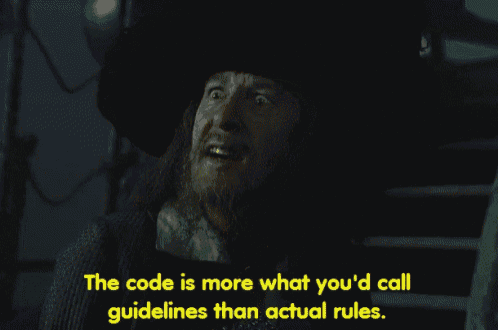
Alright, so if this is what Jack intended by “good pirate,” let’s move on to “good man.” A good man is generally considered to follow the rules. As we’ve discussed, the Pirate Code is the rules that the pirates are to follow, and Bootstrap seems to adhere to this. He also seems to have a sense of right and wrong (he feels that betraying and abandoning Jack was wrong) and justice (he claims that they deserve to be cursed to pay for their crimes). So perhaps by general, law-abiding standards, one could not fully consider him a good man. But by these standards, he definitely seems to fit the bill. Furthermore, he does seem to know that pirating is bad, as it was why he left Will and his mother and stated that it wasn’t a life he wanted for Will.
Now, we don’t really get to see Bootstrap until Dead Man’s Chest and At World’s End, but The Curse of the Black Pearl had to adequately support the theme of a good pirate being a good man in order for it to be successful and for more movies to follow. While Bootstrap is the one Jack was talking about when he gave the statement and theme of the movie, the story follows Jack himself, using him to show the example of a good pirate and a good man.
Our good old favorite Captain Jack Sparrow also fits the bill of a good pirate, good man, though perhaps not as well as Bootstrap Bill. He, like Bootstrap, follows and respects the Pirate Code. (Perhaps he gets this from his father, Captain Teague, being the keeper of the code.) He keeps to the code, following the pirate rules, but more than that, he has a basic respect and care for human life. These traits are what make it so that we can consider him a good man.
Captain Jack is contrasted against Captain Barbossa, who I argue fits the bill of a good pirate but bad man. He is a good pirate in the sense that Bootstrap and Jack were not; he is good at pirating; good at plundering, stealing, and killing. He has no respect for the code and, more importantly, no respect for basic human life. He is more than willing to take life when the opportunity arises.
Let’s walk through some scenes in the The Curse of the Black Pearl in order to explore the contrast between these two characters and better establish a good pirate, good man vs a good pirate, bad man.
The scene that allows our dear main characters, Captain Jack Sparrow and Elizabeth Swann, to first meet begins to define Jack as a good man. He is in the midst of attempting to commandeer a ship when Elizabeth passes out and falls over the edge of a high wall, sinking into the depths. Now, Jack is a criminal. He does not belong in this town. He is currently in the process of committing a crime, trying to steal from right under the guards’ noses. And yet, he hands off his beloved items and dives into the water to go after some sinking woman that he doesn’t even know. He didn’t even get a good look at her, so his motivation couldn’t possibly be related to her being attractive or of high standing. It is just simply: someone is in trouble and he is able to help. He saves her life, but wounds up being caught and chained because of it. Elizabeth, recognizing the selfless act of a good man as what it is, protests his arrest. Commodore Norrington’s statement may at this point reflect the thoughts of the audience: “One good deed is not enough to rid a man of a lifetime of wickedness.”
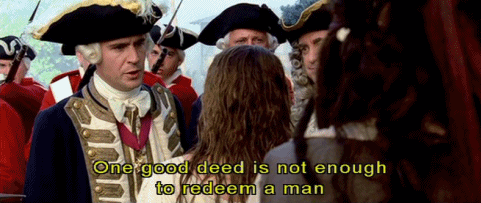
As we know, Jack ends up escaping from his captors, hiding out in the blacksmith’s shop. Which brings us to the meeting of our next dear main character, as well as our next scene that shows Jack’s character as a good man.
When Will Turner returns to the blacksmith’s shop, he notices that some things are the way he left them but others are not, and then meets the infamous Captain Jack. Armed with what he knows of pirates - that they are vile, evil people, and that this one in particular threatened his secret crush - he is ready for a fight. Jack, however, does everything he can to not fight (and more importantly: not kill) Will. He has a short sword fight with Will, treating it as a lesson, and then turns to leave. But Will blocks him. A longer and very cinematically pleasing sword fight breaks out, but it ends with Will having sand blown in his face. Jack then pleads for Will to move out of the way: “Move. Please move.” It is only when Will refuses that he draws his pistol, though he doesn’t want to shoot it. (We know he intends this shot to be for Barbossa, but everything about his mannerisms suggest that he also doesn’t want to kill Will.)

Well, Jack indeed ends up getting captured. Our next character showing scene comes at the introduction of the movie’s antagonist and Jack’s foil character: Captain Barbossa.
The Black Pearl responds to the call of the cursed Aztec gold and appears at Port Royal with cannons blazing. This alone shows Barbossa’s character; he is going to get that gold, and he doesn’t care who dies in the process. His men raid the beach, attacking and killing many of the port’s inhabitants, not to mention the vast property damage. Their arrival is loud and unmissable. Elizabeth ends up going to the ship with Pintel and Ragetti under the protection of parlay, and this is when we first see the dread pirate “so evil that hell itself spat him back out.” Barbossa follows the code this time and negotiates with Elizabeth, ultimately kidnapping her and delivering the line about the code being more like guidelines and not applying to her anyways.
We will now jump forward to Will and Jack’s escape from Port Royal. They board The Dauntless and force the crew off of it, and it should be noted that they do so without harming or killing any of the crew. Perhaps the crew is willing to disembark because, as Lieutenant Gillette states, “two men cannot man The Dauntless.” When Norrington comes on The Interceptor to catch them, Will and Jack pull the ol’ switcheroo and steal The Interceptor instead, leaving The Dauntless in such shape that it can’t pursue. Thus they stole a ship and escaped without killing a single person, all thanks to Captain Jack’s ingenious.
While they begin sailing in pursuit, Barbossa blackmails Elizabeth into having dinner with him and then shows her the nightmares of their curse before ultimately locking her up for the rest of the trip. You know, a real gentleman.
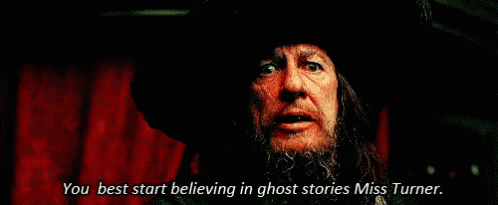
Eventually they arrive at the Isla de Muerta and they take Elizabeth to try and break the curse. Now, to his credit, Barbossa does choose to cut Elizabeth’s palm rather than kill her, saying “waste not.” However, I posit that his intentions here were not pure. He wasn’t done with Elizabeth. He had mentioned that, as part of the curse, they couldn’t “feel the warmth of a woman’s skin” and that they had an “insatiable lust.” His demeanor towards Elizabeth up to this point doesn’t suggest gentlemanly intentions. The lack of gentlemanly intentions are added to after he catches up to and sinks The Interceptor, throwing Elizabeth to his crew in order to repay her “taking advantage of his hospitality.” When making Elizabeth walk the plank, he asks for the dress back, his crew hooting and hollering as she undresses into her dressing gown. He sends Jack off with just the one shot in the pistol even though he is banishing both of them, encouraging him to “be the gentleman and shoot the lady, then starve yourself.”
Taking a step back to before he sinks The Interceptor, Jack tries to negotiate going over and getting Barbossa what he needs, to which Barbossa replies “That’s exactly the thinking that lost you the Pearl. People are easy to search when they’re dead.” Jack had such a reputation for not wanting to unnecessarily spill blood that it had upset Barbossa, and apparently other crew members, enough that they wanted to overthrow him.
This time when Barbossa and his crew take Will, the true Turner child, to Isla de Muerta, they say they will kill him and spill all of his blood. It could just be as the second mate says: they are just doing it to be sure. But as far as Barbossa is concerned, there is no real reason to keep this kid alive after using his blood. He serves no purpose and his life is meaningless to him.
Now, it is often difficult to follow dear Captain Jack Sparrow’s plans. In the original plan, he spoke of leverage, and it seemed that he was going to use Will in order to regain The Black Pearl, perhaps throwing Will away and letting him die. However, in his adjusted plan following he and Elizabeth being saved by Norrington, it seems he has accounted for saving both Elizabeth and Will. We cannot know for sure, but I would be willing to bet that Jack had planned on finding a way to ultimately save them both in his original plan, as well.
Whatever the case, his second plan ends up succeeding, at least on his end. He warned Norrington that he may want to defend The Dauntless, but Norrington ignored him, which ultimately lead to some loss of life on the ship. (It would have perhaps been less had he listened, showing Jack again seems to be thinking about how to preserve life.) Will and Elizabeth both end up surviving, Jack kills Barbossa with the single shot he’s been holding onto to repay his backstabbing old friend, and the curse is broken, allowing the rest of the crew to be killed or taken into custody. After selecting a fair bit of his enemies’ treasure, he requests that Will and Elizabeth drop him off at The Black Pearl.
However, when they leave the cave, they find that The Pearl is gone, as Gibbs and the others escaped on it. Elizabeth tells him that she’s sorry, to which Jack only replies “They’ve done what’s right by them.” Afterall, when leaving the first time, he had told them to keep to the code: “anyone who falls behind is left behind.”
Later, after Will frees Jack from the gallows and The Black Pearl rounds the bend, coming to retrieve her captain, Jack tells Gibbs “You were supposed to keep to the code.” Gibbs replies “We figured they were more actual guidelines,” echoing what Barbossa had told Elizabeth and what she, in turn, had told Gibbs and the rest of the crew. Jack then gives a very quiet, very sincere “thank you.”
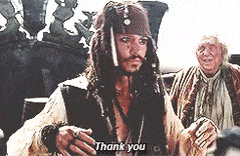
Now Captain Jack Sparrow, the good pirate and good man, sails off with his crew after having reclaimed his beloved ship. The movie does a wonderful job of showing its theme and bringing across its point. Besides seeing it in the contrast between Jack and Barbossa, you can also see it in the changes in opinion of Elizabeth and Will throughout the movie.
When Will first meets Jack in the blacksmith’s shop, he tells of his distaste for pirates with lines like “I make a point not to get acquainted with pirates” and “I practice so that when I meet a pirate, I can kill it.” He refers to the pirate as “it,” showing that he doesn’t even truly consider a pirate to be fully human.

As mentioned at the top of this post, when Will and Jack are sailing away on The Interceptor, Will becomes offended at the possibility that his father could have been a pirate, though Jack states that he was a good pirate and a good man. (Here too, it should be noted, Jack is not eager to fight Will, finding it unnecessary to do so. Also, I guess, he needs another man to help him man the ship and bring it into Tortuga.)
After Will rescues Elizabeth and leaves Jack behind, the two are below deck in The Black Pearl and Elizabeth returns Will’s medallion. When he asks why she took it, she replies “Because I was afraid you were a pirate - that would have been awful.” This shows that, despite her obsession with pirates, she considers them to be awful people. This is perhaps fueled by her recent interaction with said pirates, but even as a young girl she considered them to be awful, thus taking the medallion from young, unconscious Will.
You can see Will’s expression change when she says “that would have been awful.” You can see him look at the medallion and think it through before he says “It wasn’t your blood they needed. It was mine. The blood of a pirate.” He slams the medallion down on the table, the realization hitting him: the filthy blood of the foul creatures he so despised flowed through his veins. You can just imagine what he’s questioning. Does that make him filthy like them? Does Elizabeth, the woman he loves, view him as awful, given his heritage?
These scenes are greatly contrasted with those that accompany Jack’s hanging at the end of the movie. As Jack’s crimes are being read out, Elizabeth states “This is wrong.” The man up there, though a pirate, had saved her life multiple times over the past few days. While not the most upright of gentlemen, she knows him to be a good man.
Her father’s response is interesting. “Commander Norrington is bound by the law, as are we all.” He doesn’t deny that this is wrong. He doesn’t point out the wrongdoings and foul deeds Captain Jack has committed. He just states that this is what they must do. Their hands are tied. (Norrington, it should be noted, looks somewhat displeased with this exchange.)
Will then saves Jack from the gallows, but the two are surrounded by guards. Norrington, Elizabeth, and Governor Swann come over. Governor Swann expresses his disbelief at Will’s attempt, stating “He’s a pirate.” Will’s reply shows how truly full circle he has come.
“And a good man.”

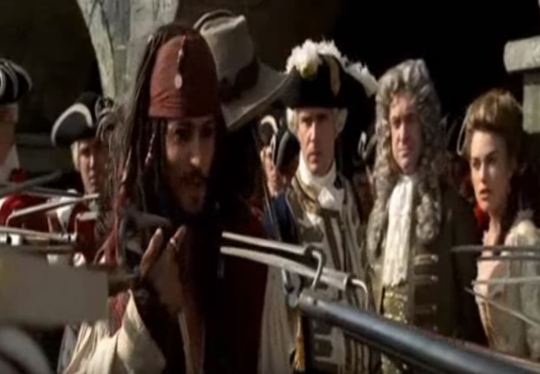
He then adds “If all that I have achieved today is that the hangman will claim two pairs of boots instead of one, so be it. At least my conscious will be clear.”
Will has found that Captain Jack Sparrow, a good pirate, is also a good man, and he is willing to die to stand by that. Elizabeth joins him, showing that so is she (though it is doubtful that the Governor would allow his daughter to be killed here, and she didn’t directly participate in the rescue attempt other than feigning passing out, so she’s at less risk).
After Jack falls into the water and is rescued by the crew of The Black Pearl, the Governor states “Perhaps, on the rare occasion, pursuing the right course requires and act of piracy. Piracy itself can be the right course.” This statement seems to follow a sort of “Robin Hood,” vigilante mentality. Maybe you must occasionally bend, or even break, the rules to do the right thing. Governor Swann also thinks that Jack is a good man, even if a foul one he’d rather his daughter not associate with.
After Norrington leaves, the Governor turns to his daughter and Will, asking if this is truly the man she wishes to marry. While he will acknowledge that a man of filth such as a pirate can be a good man and do the right thing, he is still a man of high standing and wishes that for his daughter. He states “After all, he is a blacksmith.” I propose that Elizabeth’s reply, “No. He’s a pirate,” has a deeper meaning. Given the theme of the movie, and how the two’s view as changed over the course of it, I posit that it could be replaced with:
“He’s a good man.”

Evidence of Jack being a good man while Barbossa is a bad man can be found throughout the rest of the Pirates of the Caribbean movies, as well. Will and Elizabeth’s perspectives of pirates continue to evolve. While the theme becomes less of a major focus in the later movies, The Curse of the Black Pearl’s defining theme: “Good pirate, good man” is still a key part of the series.
If you’d like to see more evidence through out the following movies, here’s part 2.
#potc#pirates of the caribbean#the curse of the black pearl#dead man's chest#at world's end#potc spoilers#I overanalyze everything#I overanalyze potc#good pirate good man#captain jack sparrow#elizabeth swann#will turner#theoveranalyzer#cktheoveranalyzer#barbossa
24 notes
·
View notes